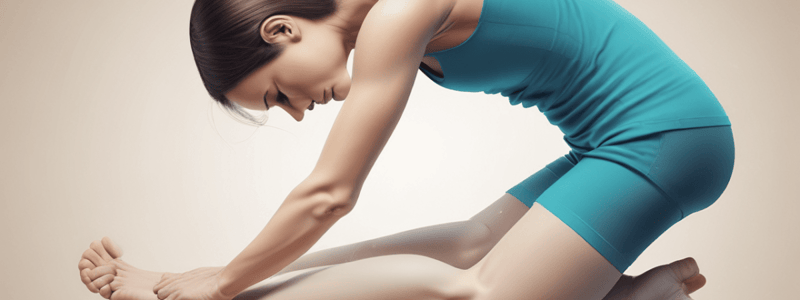Podcast
Questions and Answers
Which therapy is primarily needed to help the patient avoid further injury?
Which therapy is primarily needed to help the patient avoid further injury?
- Cognitive therapy
- Behavioral therapy
- Occupational therapy (correct)
- Speech therapy
What is a common clinical feature of arthritis that includes pain, stiffness (especially in the early morning), loss of function, and inflammation?
What is a common clinical feature of arthritis that includes pain, stiffness (especially in the early morning), loss of function, and inflammation?
- Headache
- Fever
- Joint instability (correct)
- Elevated heart rate
Which type of arthritis commonly affects the DIP, 1st MCP, 1st MTP, spine, hip, and knee joints?
Which type of arthritis commonly affects the DIP, 1st MCP, 1st MTP, spine, hip, and knee joints?
- Osteoarthritis (correct)
- Rheumatoid arthritis
- Tuberculous arthritis
- Septic arthritis
What radiological findings are commonly observed in joints affected by osteoarthritis?
What radiological findings are commonly observed in joints affected by osteoarthritis?
Which investigative procedure is commonly performed to assess the extent of joint involvement in arthritis?
Which investigative procedure is commonly performed to assess the extent of joint involvement in arthritis?
What is a common symptom associated with arthritis that worsens towards the end of the day?
What is a common symptom associated with arthritis that worsens towards the end of the day?
What is the suspected mechanism of immunogenesis in the context of the pathology described?
What is the suspected mechanism of immunogenesis in the context of the pathology described?
Which joints are typically affected first in the clinical presentation described?
Which joints are typically affected first in the clinical presentation described?
What deformities can be observed in the fingers as a result of the condition described?
What deformities can be observed in the fingers as a result of the condition described?
What is the potential consequence of atlanto-axial subluxation mentioned in the text?
What is the potential consequence of atlanto-axial subluxation mentioned in the text?
What management approach is suggested for this condition besides physical therapy and aids?
What management approach is suggested for this condition besides physical therapy and aids?
Besides rheumatoid arthritis, what other extra-articular feature is highlighted in the text?
Besides rheumatoid arthritis, what other extra-articular feature is highlighted in the text?
Study Notes
Rheumatoid Arthritis
- Persistent symmetrical polyarthritis, more common in females
- Pathology: Immunogenesis via presentation of antigen to T-helper cells, leading to cytokine-mediated synovial neutrophil exudate, cartilage degrading enzymes, and pannus formation
- Clinical features: Swollen, painful, stiff hands and feet, especially in the am, at 1st PIP, MCP, and wrist joints
- Swelling leads to ulnar deviation and volar subluxation at MCP joints, Boutonniere and swan neck deformities of the fingers, and Z deformities of the thumbs
- Wrist subluxation, tendon rupture, wasting of adjacent muscle, and Atlanto-axial subluxation may threaten the spinal cord
- Extra-articular features include anaemia, etc.
Physical Therapy
- Necessary to facilitate and maintain active range of motion, flexibility, and strength
- Relieves musculoskeletal pain associated with muscular weakness, paralysis, and immobility
- Passive range of motion exercises are preferred to avoid overexertion and muscle damage
- Occupational therapy helps patients avoid further injury
Arthritis
- Clinical features: Pain, stiffness (especially in the early morning), loss of function, inflammation
- Differential diagnosis: Monoarthritis (septic arthritis, TB arthritis, trauma, gout, spondyloarthritidis, osteoarthritis, haemarthrosis), polyarthritis (rheumatoid arthritis, rheumatic fever, viral illness, SLE, crystal-induced arthritis)
- Assessment: Extent of joint involvement, symmetry, change in anatomy, limited movement, associated features
- Investigation: X-ray, joint aspiration, blood tests (CBC, ESR, collagen vascular screen)
Osteoarthritis
- Most common joint condition
- Clinical features: Pain on movement, worse at the end of the day, stiffness, joint instability, joint tenderness, bony swelling, poor ROM
- Most commonly affected joints: DIP, 1st MCP, 1st MTP, spine, hip, and knee
- Radiology: Loss of joint space, subchondral sclerosis and cysts, marginal osteophytes
Studying That Suits You
Use AI to generate personalized quizzes and flashcards to suit your learning preferences.
Related Documents
Description
Test your knowledge on the importance of physical and occupational therapy in maintaining range of motion, flexibility, strength, and relieving musculoskeletal pain. Learn about the differences between active and passive range of motion exercises and the role of occupational therapy in preventing further injury.



